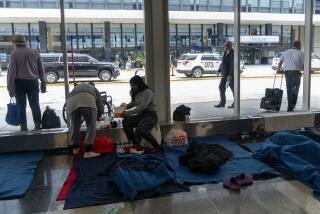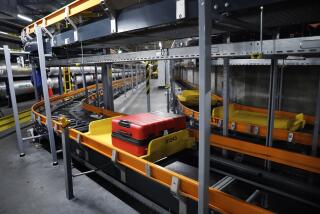FAA still seeing lapses at O’Hare airport
- Share via
Federal agents observing security checkpoints at O’Hare International Airport say they continue to find lapses, including passengers being scanned too quickly with hand-held metal detectors and screeners failing to thoroughly examine each carry-on bag passing through X-ray machines.
In the four terminals at O’Hare, the agents who have spent several days at the airport assisting the Federal Aviation Administration’s security force said they saw disparities in how passengers and their carry-on bags are scrutinized. They said they also have seen wide variances in the willingness of checkpoint workers to accept suggestions from FAA experts on improving their techniques.
A preoccupation with rooting out newly banned items such as pocketknives also might be hindering efforts to identify more dangerous objects, they said. Screeners in Saturday’s breach in the United Airlines terminal working for Argenbright Security confiscated scissors that were in a bag belonging to Subash Gurung, a Nepalese citizen. But they failed to notice seven knives, a stun gun and a can labeled pepper spray in the same duffel bag.
“The screeners are so hot on [catching] tweezers and nail clippers in bags, but they are missing other potential stuff,” one agent said. “The screener at one X-ray machine confiscated a guy’s clippers, but he never caught the saw and the three replacement blades inside the bag.”
The items were later found by airline employees at a backup checkpoint at the departure gate, the agent said.
Praise for one firm
The agents said compliance with the rules was best in Terminal 2, where the main carrier, Northwest Airlines, has contracted with Globe Aviation Services to provide checkpoint security.
FAA agents said they have had to spend more time “correcting and counseling” the checkpoint employees in United’s Terminal 1 and American Airlines’ Terminal 3, both of which have hired Argenbright to run passenger screening.
“The Globe people are very receptive to advice and input and they want to work with the National Guard, who often watch the [X-ray] monitor with them,” an agent said. “Argenbright does not like that at all and complains. It’s a huge, noticeable difference.”
Argenbright has had a history of problems, including falsifying its training of airport screeners and failing to conduct the required criminal background checks on people applying for jobs.
The company pleaded guilty last year to charges that it forged workers’ histories to hide criminal convictions. Last month, federal prosecutors alleged that the company continued to hire individuals with felony convictions.
Investigators found that at LaGuardia International Airport in New York, for instance, the company hired a screener with felony gambling convictions that would have disqualified him from the work. Five other screeners were allowed to begin work without undergoing background checks.
Airlines back Argenbright
Mary Frances Fagan, American’s spokeswoman at O’Hare, said the company is satisfied with Argenbright’s performance, which the airline switched to about two years ago after previously having a contract with Globe.
United spokesman Andy Plews disputed the reports by the special agents, saying, “The FAA has told us there is no measurable difference between the operations of Argenbright and others at O’Hare.”
Argenbright President Bill Barbour and other company officials did not respond to questions.
The federal agents interviewed by the Tribune said screener mistakes that they observed in recent days included failing to conduct slow and methodical checks with metal-detecting wands of passengers’ bodies--especially women with thick hair and people wearing hats, scarves or turbans.
When the wand produced a “hit”--signaling the possible presence of a metal object--screeners did not always follow procedures aimed at determining why the alarm went off, the agents said. They also failed to consistently pat down the passenger as required.
Compliance was also spotty regarding a new FAA security directive that says each carry-on bag must be stopped on the X-ray conveyor belt to give screeners a better look at the contents, instead of allowing them to scroll by continuously as before.
The criticism by the agents also extended to airline personnel who have complained that extra checkpoint staffing by agents from several federal agencies and Guard troops is bogging down the lines.
Tribune staff reporters Lynette Kalsnes and Tom McCann and Tribune wire services contributed to this report.
More to Read
Sign up for Essential California
The most important California stories and recommendations in your inbox every morning.
You may occasionally receive promotional content from the Los Angeles Times.










